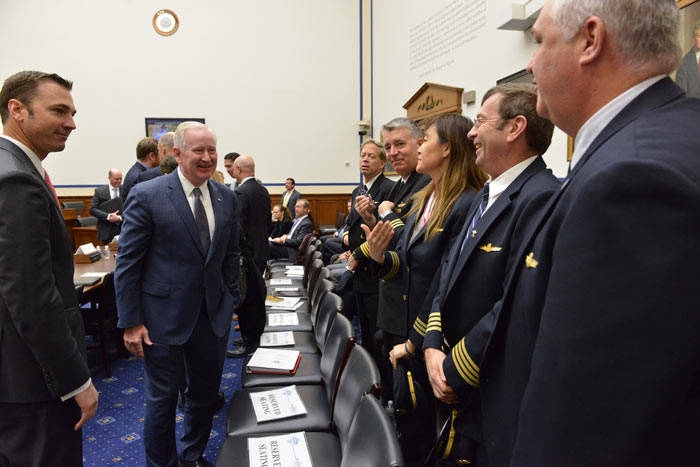From the Hill: ALPA to Congress: Maintaining Safety Means Maintaining Safety Standards
By John Perkinson, Senior Staff Writer

Capt. Tim Canoll, ALPA’s president, second from left, greets ALPA members and staff attending the House Aviation Subcommittee hearing titled “State of Aviation Safety.”
Capt. Tim Canoll, ALPA’s president, testified before the Aviation Subcommittee of the U.S. House of Representatives Committee on Transportation and Infrastructure on February 27, commenting on the nation’s impeccable aviation safety record and what it will take to maintain this remarkable achievement moving forward. “Experience counts when operating complex equipment in a changing environment,” he said, adding, “so does constantly maintaining and sharpening [pilot] skills and judgment through training.”
Canoll observed, “ALPA pilots know that this subcommittee recognizes the value of flight experience, qualifications, and training for airline pilots. You led Congress in passing the Airline Safety and FAA Extension Act of 2010, the set of regulations that resulted in improved pilot training and updated certificate and type-rating requirements.” Much of the testimony from ALPA’s president was geared to dissuade any considerations to roll back first officer qualification and training standards set by this landmark legislation.
“Flying experience enables pilots to learn how to gather information through their senses about their environment and their aircraft,” Canoll said, adding that these real-world experiences can’t be simulated. As an example, he noted that an airline pilot might encounter multiple flights communicating over the radio simultaneously, unexpected turbulence or dynamically changing weather conditions, and an engine malfunction at the same time. “Today’s simulators, while good at training procedures and system operations, can’t replicate the complexity of airline flight,” he remarked.
Canoll stated that the best and most important safety feature of any airline operation is a well-trained, fully qualified, highly experienced, and adequately rested professional flight crew. “The results speak for themselves,” he asserted, noting that “in the 20 years prior to this congressional action, more than 1,100 passengers lost their lives in U.S. Part 121 airline accidents. Since Congress acted, that number has been reduced to zero.”
Safety is nonnegotiable
In written testimony submitted separately to the subcommittee, ALPA’s president observed, “In the same nine-year time frame that there have been no fatal U.S. passenger airline accidents, there have been 81 fatal passenger accidents around the world, which include more than 4,100 fatalities.”
Canoll asserted that “safety regulations shouldn’t be driven by the economic goals of airlines,” adding that some carriers believe that safety can be negotiated. He compared the potential downgrading of pilot safety and training standards to that of shortening the duration of medical school as an attempt to attract more doctors.
During his testimony, Canoll highlighted other important components to protecting aviation’s safety record, including the need to do more to safeguard the air transport of lithium batteries and current loopholes that prevent the FAA from regulating unmanned aircraft systems used by hobbyists.
He was one of five subject-matter experts—including influential leaders from the FAA, the NTSB, NASA, and the Office of Inspector General for the Department of Transportation—who testified before the House Aviation Subcommittee at a hearing titled “State of Aviation Safety” held at the Rayburn House Office Building in Washington, D.C. Rep. Frank LoBiondo (R-N.J.), the subcommittee chair, framed the discussion in his opening remarks, noting that the hearing would “focus on the subcommittee’s number one priority: ensuring the safety of the U.S. aviation system and the traveling public.”
Experience saves lives
The subcommittee hearing comes at a time when Congress continues to rely on short-term funding for the FAA, despite the need for long-term investment in the agency’s programs and personnel and in the nation’s aging aviation infrastructure. As the issue went to press, the latest stopgap measure—passed last fall—kept the agency operating through March 31, and debate continued about what should be included in the next FAA funding bill.
“The most important work this committee can accomplish is to ensure that the United States maintains the highest safety levels in the world and continues to lead by example,” said Canoll during the hearing. “I hope you share my optimism today as we consider the U.S. airline industry’s incredible safety record. Take it from us, your pilots: experience saves lives.”

